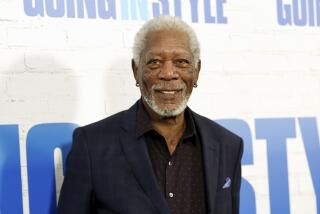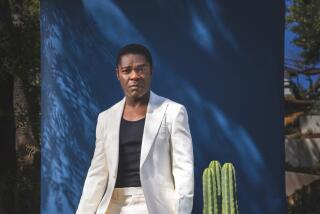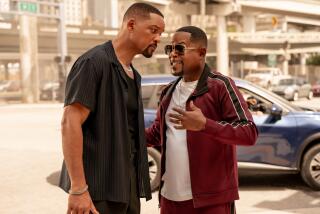Acting is in Morgan Freeman’s blood
Morgan Freeman is neighing like a horse recalling one of his earliest “acting” memories.
“I always was an actor,” said the 74-year-old who won the supporting actor Oscar for 2004’s “Million Dollar Baby.” “I didn’t become an actor, this is what I was meant to do. I remember an incident when I was 5 years old. I had a friend, and we used to play different kinds of games.”
One day in rural Mississippi, Freeman and his friend were playing horse and buggy. “What you do is that you get a clothes line and wrap it around yourself if you are the horse,” he said. “My friend was the driver, and we would go through the town. This lady, Mrs. Hackman, saw us running out there in the sun and said, ‘Why don’t you come in and drink some water?’”
Freeman never broke character. When she gave him a cup of water, Freeman stuck his head in the cup and drank like a horse, neighing between gulps. “She said ‘What in the world are you doing?’ I said, ‘I’m a horse, Mrs. Hackman.”’
Over the decades, Freeman’s roles have become a bit more sophisticated. He’s played a vicious pimp in 1987’s “Street Smart,” (his first supporting actor Oscar nomination), a devoted chauffeur for a Southern Jewish woman in 1989’s best picture winner, “Driving Miss Daisy” (lead actor nomination), a former boxer in “Million Dollar Baby” and South African President Nelson Mandela in 2009’s “Invictus” (lead actor nod).
His latest honor is the American Film Institute Life Achievement Award. Freeman becomes the second African American to receive the award; Sidney Poitier was the first, in 1992. The star-studded event will take place Thursday evening at Sony Pictures’ historical Stage 15, where “The Wizard of Oz” was shot, and will air June 19 on TV Land.
On a recent afternoon, Freeman was holding court in the library of the AFI Campus off Western Avenue in Hollywood. He had just finished a question-and-answer session with students at the AFI with writer-director Edward Zwick, with whom he worked on the 1989 Civil War epic “Glory.” He’s wearing a therapy glove on his left hand, the only visible signs of the near fatal car crash he suffered three years ago near Ruleville, Miss. He still can’t use the hand, but that hasn’t slowed his career.
“As soon as the shot is over, I put it back on to stop the swelling,” Freeman explained. “It’s a security blanket for me now.”
Freeman wasn’t exactly an overnight sensation. In fact, he didn’t find real success until he turned 50 — “Street Smart” was released that year, and he starred off-Broadway in the stage production of “Driving Miss Daisy.” Previously, he had appeared onstage and in small roles in films and played Easy Reader and Vincent the Vegetable Vampire from 1971 to ’77 on the PBS kids show “The Electric Company.” He even danced at a pavilion at the 1964 Worlds Fair in New York.
“My feeling is that all things happen in their own time,” he said matter-of-factly. “Your life is on a trajectory, and you have some control over it, but not all of it. People say, “Are you upset that it took so long for your career to get trajectory?,’ and I say, ‘No. It didn’t have to get trajectory at all.’”
Clint Eastwood, who has directed the actor in some of his greatest roles, including “Million Dollar Baby,” believes that Freeman’s experience and professionalism always shine through.
“I used to watch him on ‘Electric Company’ when my son was very young,” Eastwood recalled. “He’s danced onstage. He’s sung onstage. He comes completely prepared. You don’t have to go to any great lengths to make him extra comfortable. He’s just right there and ready to go — you could shoot rehearsals with him.”
Zwick said Freeman has a “moral authority in his life and in his work. His presence is both commanding and subtle. He also has an enormous gratitude for the opportunities he has had. In my experience, people who have knocked about and really paid their dues have a great and sometimes greater appreciation for the privilege of getting to do things.”
An actor’s calling
Freeman turned down a scholarship to study drama at Jackson State University and enlisted in the Air Force because he wanted to get out of Mississippi. “I had really decided when I was 16, I wanted to be a fighter pilot,” he said with a wide grin. “I was disposed of the notion of being one when I was 21. I got to actually climb up into a jet fighter. As I sat there, I had an epiphany.”
He realized that his desire to be a fighter pilot was more about the romance of war he had seen in movies than actually wanting to be a fighter pilot. “There was no camera [in the cockpit],” he said. “The romanticism of war is all about the movies. So I walked away from the Air Force after three years, eight months and 10 days.”
So he came out to Los Angeles. “I had an apartment in the Crenshaw district,” he recalled. “I got out in February and ran out of money in late March. I almost starved in April. A lady friend worked at the Board of Education. She got me a job as a transcript clerk at Los Angeles City College.”
He was invited to take classes for free. He enrolled in classes in acting, voice and diction and credits his teacher, Robert Whitten, in helping him lose his Southern accent. “By the end of two semesters, people would say, ‘You must be an actor, you have a beautiful speaking voice.’”
Freeman is now most closely associated with his work with Eastwood — they first paired in Eastwood’s 1992 best-picture western “Unforgiven,” in which he plays a retired gunfighter who teams with Eastwood’s former killer, then “Million Dollar Baby” and “Invictus.”
Eastwood said the two would run into each other over the years and talk about their love of westerns (Freeman cites “High Noon” as a favorite). “He said, ‘If you need somebody to ride along with you, give a yell,’” Eastwood said.
After one of their conversations, Eastwood took the script of “Unforgiven” out of a desk drawer where it had been for a few years. “I started looking through it, and I started to think this character would be perfect. I called him up and asked if he wanted to do it, and he said yeah. I said, ‘Don’t you want to read it?’ And he said, ‘No. I’m ready.’ He loves horses, and when we were in Alberta, Canada [shooting], every second he wasn’t working on the show he was out on a horse, even doing rodeo things on the weekend.”
“One of the great things about him is how quick he is,” said Freeman of Eastwood. “He doesn’t second guess. When we did ‘Invictus,’ he would do one take and say, ‘OK, we will do another for safety.’ He trusts his actors.”
More to Read
The biggest entertainment stories
Get our big stories about Hollywood, film, television, music, arts, culture and more right in your inbox as soon as they publish.
You may occasionally receive promotional content from the Los Angeles Times.











